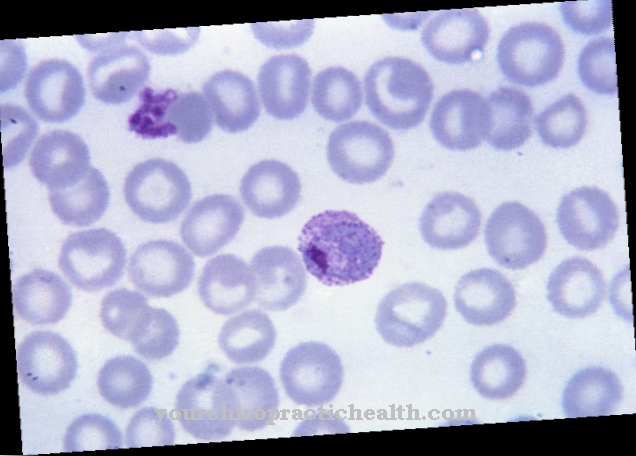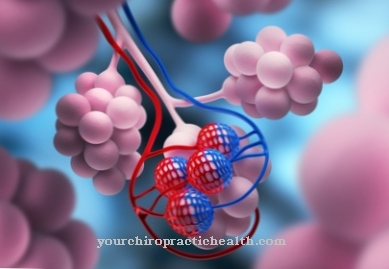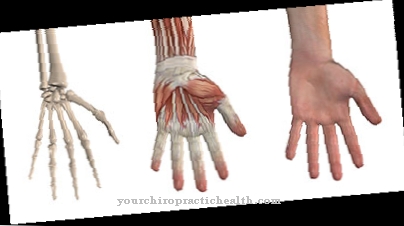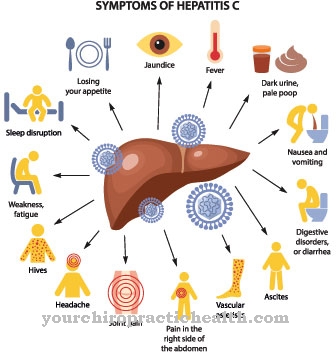The feeling constant fatigue is an everyday burden for many people. In many cases, however, no precise cause can be found despite extensive diagnostics. Daytime tiredness often tends to become chronic and can have a negative impact on life in all areas.
What is constant fatigue?

Fatigue that occurs at times during the day is still normal in adults and does not necessarily have to be pathological. Diagnostic and therapeutic action is only necessary from a certain degree of expression and when physical or mental processes are affected by tiredness.
Sporadic fatigue in and of itself does not have any disease value, but constant fatigue, which must be considered a medical alarm signal. The constant tiredness is usually accompanied by other unpleasant symptoms such as listlessness, exhaustion, lack of sleep or fatigue.
The more pronounced the sequence of these symptoms, the more dramatic and restrictive the resulting reduced quality of life is perceived by an affected person. Constant fatigue occurs in all strata of the population, and according to the unanimous opinion of sleep doctors, women are more affected, which is, among other things, related to the special female hormonal system.
After all, more than 30 percent of all adults over 16 years of age state that they suffer from temporary or frequent fatigue. Interestingly, the studies and surveys have also shown that people from higher social classes and those who live in a partnership are less likely to suffer from constant fatigue.
causes
Research into the cause is particularly important in the case of constant tiredness, as serious, life-threatening clinical pictures can also be hidden behind this symptom. In the vast majority of patients, however, no exact cause can be found despite detailed diagnostics and despite the often high level of suffering. Often these patients come to many doctors and therapists in the hope of finding an explanation for their persistent symptoms. The most common cause of constant tiredness is lack of sleep, caused by difficulty falling asleep or staying asleep.
The lack of sleep can in turn be caused by an unfavorable lifestyle that goes against the natural sleep-wake cycle, for example through shift work. A lack of exercise, obesity, diets, stress and dry, polluted air can also lead to constant fatigue. More serious causes of constant fatigue include hypothyroidism, anemia, infectious diseases, low blood pressure, or cancer.
Due to anemia, these can lead to the so-called Chronique Fatigue Syndrome, which is also associated with leaden fatigue. Certain allergies or side effects from certain medications can also make people feel weak and tired all the time. It is known from psychiatry that neuroses, depression and psychoses can also be temporarily or permanently accompanied by severe feelings of tiredness.
You can find your medication here
➔ Medicines against tiredness and weaknessDiseases with this symptom
- Hypothyroidism
- Hypotension
- neurosis
- Cardiac arrhythmias
- Iron deficiency anemia
- tumor
- psychosis
- Mineral deficiency
- Infectious diseases
- Chronic fatigue syndrome
- Obesity
- Burnout syndrome
Diagnosis & course
The course of the disease is often chronic, in which case the symptom of constant exhaustion can significantly reduce the overall quality of life. Often times, the doctor can use the medical history to narrow down the possible causes for constant fatigue. The doctor will want to know, for example, how tiredness is during the day, how long the tiredness lasts or what other complaints are associated with it. It is also important to know how a patient sleeps or whether he snores.
In this case, an extended diagnosis in a sleep laboratory can follow in order to diagnose or rule out the presence of a sleep apnea syndrome. Extended diagnostics include a comprehensive blood test with which it is possible, for example, to rule out iron deficiency as the cause. In order to rule out possible organic causes, an EKG, an EEG or a long-term blood pressure measurement can also be performed.
Complications
Chronic fatigue, if left untreated, can worsen to complete bed rest. This has a massive impact on the quality of life of those affected. Illnesses caused by lack of exercise or a one-sided diet are favored. Relatives and friends often react with incomprehension.
Added to this are their own feelings of being overwhelmed and inadequate, which many patients experience. This psychological stress can lead to depression. Death is sometimes an indirect result of excruciating exhaustion. A small percentage of those at risk of suicide actually commit suicide.
Even with treatment, many sufferers struggle to cope with everyday life. This affects the social environment, primarily the family. Work is limited to the bare minimum, there is no more energy left for activities with children or partners. As some patients report, the energy available to them is barely enough for household chores.
In addition, the often expensive drugs and food supplements as well as frequent visits to the doctor put a strain on the household budget. Many people who are permanently tired lack the energy to work. Others are forced to work part-time. In any case, the quality of work suffers and the accident potential increases.
When should you go to the doctor?
Constant tiredness can have various causes and does not always require treatment by a doctor. In most cases, this occurs due to stress or insomnia and is usually relatively easy to treat through self-help. However, if the patient suddenly becomes constantly tired and this severely restricts the patient's everyday life, a doctor can be consulted. In the worst case, the patient suffers from cancer that leads to fatigue.
It is also advisable to consult a doctor if you are tired due to stress. A psychologist can also be visited directly, as the stress and tiredness usually have psychological causes. If the patient does not yet know the cause of the tiredness, a general practitioner can usually be asked for advice. A visit is also recommended if the tiredness occurs for no particular reason or without excessive physical stress. This can also be a serious underlying disease.
Doctors & therapists in your area
Treatment & Therapy
Therapy for constant fatigue should be based on the underlying cause. This is especially true when serious illnesses or health disorders are the cause. Sleep apnea can now be easily treated with medical aids such as breathing masks. When a patient stops snoring, the constant daytime sleepiness often disappears spontaneously.
The heart and circulation are also significantly relieved. Since many patients with sleep apnea are significantly overweight, every kilo less is also a way to reduce daytime sleepiness. Hypothyroidism, iron deficiency or infections as the cause of chronic fatigue can often be treated surprisingly well once the diagnosis has been made.
If the cause is mental illness, behavioral or exercise therapies can help. If a drug side effect is responsible for the symptom of constant tiredness, then in most cases alternative preparations with other active ingredients can often ensure that the tiredness disappears. Medicines for high blood pressure, antihypertensive drugs, often cause fatigue as a side effect.
If the symptom is too severe, the dose can also be reduced if the main effect of lowering blood pressure is retained. So-called power napping, i.e. the small, controlled nap in between, can be very helpful in overcoming a constant feeling of fatigue.
Outlook & forecast
Constant fatigue can be caused by many different diseases. In most cases, constant fatigue leads mainly to stress and an aggressive posture due to lack of sleep. This often leads to social problems. Without treatment, constant fatigue will not improve if its cause is not discovered and treated.
Treatment can either be provided by a psychologist or with the help of medication. Often another symptom is hidden behind the constant tiredness, which is the cause. If this symptom is treated successfully, the constant tiredness will also go away and will not lead to further difficulties.
In addition to the tiredness itself, those affected often suffer from headaches, back pain and a general malaise. This means that tiredness also affects everyday working life and can negatively affect it without treatment. A change in diet or sporting activity often helps to counteract and curb constant tiredness. Treatment usually leads to a positive course of the disease.
You can find your medication here
➔ Medicines against tiredness and weaknessprevention
Even with constant tiredness for unknown reasons, patients can do a great deal by making lasting and really consistent changes in lifestyle in order to feel more vitality and resilience again. It is important to create an individual balance between relaxation and performance so that the vicious circle of overwork and lack of sleep can be broken.
A balanced, vitamin-rich and low-fat diet as well as adequate fluid intake during the day must always be ensured. Regular exercise, alternating showers and stress relief also get the circulation going again.
You can do that yourself
Since constant tiredness can significantly limit concentration, special care is required when performing certain activities. This includes, for example, driving a car, operating machines or working on scaffolding or ladders. If fatigue is severe or has other complications, people may need to avoid such activities. Otherwise, at least very careful consideration is required in each individual case in order not to drastically increase the risk of accidents for yourself and other people.
If the constant tiredness is due to lack of sleep (for example in the case of insomnia), good sleep hygiene can support the treatment. The bed is only used for sleeping and not for sitting or lying down during the day. Quiet evening rituals and relaxation exercises also bring improvements in some cases. Fixed bed times are also an important part of good sleep hygiene.
In addition, eating a healthy diet and maintaining a balanced fluid balance can help combat constant tiredness - especially fatigue that is due to malnutrition. Even with mental fatigue (e.g. in the context of depression), a nutrient-rich diet can have positive effects and have a supportive effect, without however replacing targeted treatment.
In order to cope with everyday life with constant tiredness, some sufferers need help from other people. Therefore, it often makes sense to openly address the problem in the family and, if necessary, to ask for temporary support.

























.jpg)


